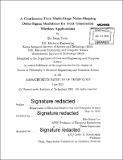A continuous-time multi-stage noise-shaping delta-sigma modulator for next generation wireless applications
Author(s)
Yoon, Do Yeon
DownloadFull printable version (16.46Mb)
Other Contributors
Massachusetts Institute of Technology. Department of Electrical Engineering and Computer Science.
Advisor
Hae-Seung Lee.
Terms of use
Metadata
Show full item recordAbstract
A continuous-time (CT) delta-sigma ([delta][sigma]) modulator for modern wireless communication applications is investigated in this thesis. Quantization noise is suppressed aggressively by increasing the effective order of the noise transfer function (NTF). In order to increase the effective order of the NTF, a 2-loop sturdy multi-stage noise-shaping (SMASH) architecture is utilized. The proposed CT SMASH architecture has a much wider signal bandwidth which was limited in the discrete-time (DT) SMASH architecture due to the inherent sampling frequency limitation of the DT implementation. Furthermore, the proposed CT SMASH architecture provides a better quantization noise suppression capability than the DT SMASH architecture by more completely canceling the quantization noise from the first loop. The CT SMASH architecture is implemented with several circuit techniques suitable for high operation speed. These circuit techniques allow the proposed CT [delta][sigma] modulator to achieve wide bandwidth, high resolution, and low power consumption for modern wireless communication applications. As a result, the prototype fabricated in 28nm CMOS achieves DR of 85dB, peak SNDR of 74.9dB, SFDR of 89.3dBc and Schreier FOM of 172.9dB over a 50MHz bandwidth at a 1.8GHz sampling frequency.
Description
Thesis: Ph. D., Massachusetts Institute of Technology, Department of Electrical Engineering and Computer Science, 2015. Cataloged from PDF version of thesis. Includes bibliographical references (pages 115-121).
Date issued
2015Department
Massachusetts Institute of Technology. Department of Electrical Engineering and Computer SciencePublisher
Massachusetts Institute of Technology
Keywords
Electrical Engineering and Computer Science.